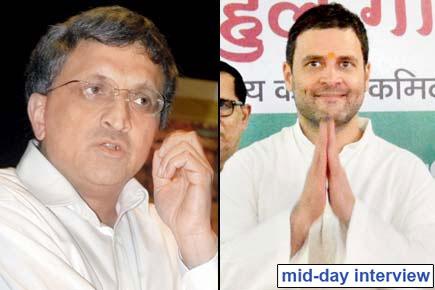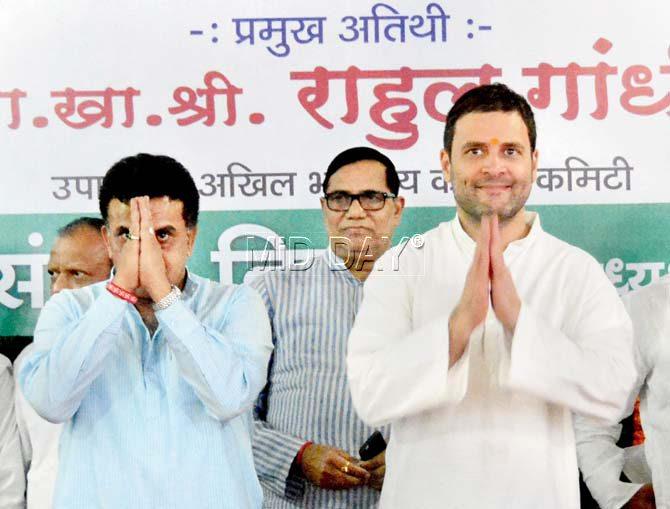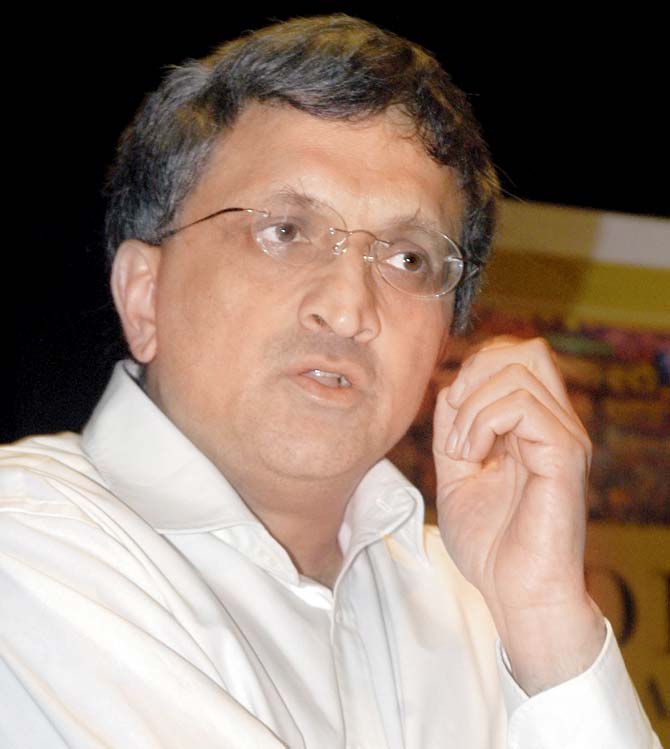Historian Ramachandra Guha, who will talk on challenges of contemporary history on Tuesday, speaks about why he believes Rahul Gandhi is unfit to lead a major political party like the Congress

Ramachandra Guha and Rahul Gandhi
The absence of historical context has been a major issue when it comes to political writing in India. While context is essential to understanding the undercurrents that sway today’s political strategies, historian Ramachandra Guha feels it is sorely missing from Indian writing thanks to what could be called the history-political sciences divide.
ADVERTISEMENT

Rahul Gandhi, seen here with Mumbai Congress chief Sanjay Nirupam yesterday, is not a leader that inspires confidence even in his own party men, believes Ramchandra Guha. Pic/Bipin Kokate
As Guha, one of the country’s foremost intellectuals, himself puts it: "In the Indian education system, everything that happened before 1947 is History, and after 1947 is Political Science. Historians do not transgress beyond that date."

Ramachandra Guha
And it is the works of political scientists and sociologists that we have to turn to understand about what has happened to India after independence. To ignore what Guha refers to as “the large-scale Indian political experiment,” — essentially, the history of the Republic of India — is to turn a blind eye to the fault lines that continue to threaten this democracy. "In our seventh decade of freedom, historians need to cross this Lakshman rekha,” stressed the acclaimed author of India after Gandhi.
Excerpts:
Q. What impedes the construction of an archive of contemporary history?
A. For one thing, the closer you are to an event in time, the harder it is to write about. For instance, we don’t know whether economic liberalisation will be good or bad, or how Narendra Modi will be remembered - it’s easier to write about the distant past. Another challenge we face is that even the Indian who is interested in politics has no live controversial views on figures such as (Jawaharlal) Nehru, (Bal Gangadhar) Tilak or (BR) Ambedkar.
Limitations on free speech and expression pose another challenge. The culture of intimidation of politics here is inhibitive. If I write about the Bengal Famine of 1943 it’s unlikely my book will be a subject of controversy, but if I write about farmer suicides and the policies that cause it, there will be uproar. There is certainly a growing intolerance of scholarly views and debate. On Tuesday, I will be offering examples of the kinds of books young scholars can write to overcome these challenges.
Q. The Congress led-UPA is perceived by many to have been extremely corrupt and the BJP is viewed as divisive. What’s your view on these labels? Also, why do they stick?
A. We must move beyond labels to examine the practice and the leadership style of parties, which is where scholars come in. When labels endure for some time, however, there is some truth to it. The Congress has been known for corrupt practices for 30-35 years, the BJP has been divisive for as many years. It’s superficial, sure. But, if a large section of India has thought this for 30 to 40 years and the party has not amended it, there is some truth in it.
Q. Tell us about your forthcoming publication, Democrats and Dissenters.
A. It’s a collection of 19 major essays ranging from 8,000 to 10,000 words. Some are profiles of intellectuals like Eric Hobsbawm, Amartya Sen and Tagore, some are based on my travels overseas - I’ve compared the Indian political experiment with China and Sri Lanka.
There are essays on the darker side of the Indian democracy, for example, one on adivasis as the most victimised group. There are four groups of Indians that are marginalised - Dalits, Muslims, Women and Adivasis. While Dalits, Muslims and women are marginalised, hated and discriminated against, at least their problems are written about and make it into the public discourse. But the problems of adivasis, who are discriminated against the most, remain invisible until Maoists come and work there.
And then there are essays with a slightly lighter tone. One is titled, "The Greatest Indian after Gandhi" and examines how we judge greatness; another was something I’d originally written after the terror attacks in 2008. An editor had asked me if 2008 was our worst year with communal violence, floods, etc. So I wrote an essay about the worst year in India since 1947. In 1948 we had the Partition, in 1966 famine stalked the land, in 1984, there was the Bhopal Gas Tragedy and pogrom directed against Sikhs following Indira Gandhi’s assassination. So, there are multiples essays and various different arguments that you can explore.
Q. Why is it that the plight of tribals doesn’t get the attention it deserves?
A. It’s always complex and nuanced - why something has happened or not happened.
For one thing, adivasis have never had an articulate orator, an Ambedkar for the adivasis, someone who provides a compelling vision. Second, they live in inaccessible areas. Besides, they’ve always remained in the blind spot of the national movement. Gandhi, Nehru, Patel, all understood that women have to be made equal partners, they were all conscious of the horrors of the caste system and all understood the need for India to function as a multi-faith society, but the adivasis were never understood.
Dalits and Muslims play a role in the 350 constituencies so you’ll see all the political parties falling all over Ambedkar these days, never mind their party’s history. But adivasis who live in the forests and upper lands are not much of an influence on election, hence they’re ignored.
Q. How is it that partisan politics - issues such as "cow protection" that you’ve written was used way back in 1952 to unify Hindus - continues to be a favoured tool for parties in an India that’s really looking for development, improved communications, progress and literacy?
A. This is not what Narendra Modi promised voters in 2014. It’s clearly with an eye on the Uttar Pradesh elections. You’re going to witness polarisation on one side by Amit Shah, on the other side by Azam Khan. I find this very worrying because they have no larger agenda - both are fully interested in polarisation. Hence, the resurrection of the cow protection issue. It’s shameful and poisonous and does not augur well for our democracy.
Q. Narendra Modi’s government has disappointed on many counts — he has not delivered on the economic development, the promise that was really the key to his victory. Do you predict a return of the Congress?
A. No, and I don’t mind being quoted on this. Rahul Gandhi is an incompetent leader, unfit to lead a major party. There may be some natural incumbency, so from 44 seats (in the Lok Sabha), it may go to 80 or even 100, but the Congress is on the decline. Rahul Gandhi is manifestly unsuited to politics. He is not a leader that inspires confidence even in his own party men.
Q. You get more than your share of hate mail. Do you expect to offend any particular groups with Democrats and Dissenters?
A. The thing is this: Of course, there may be people who get offended, but I wish people would read it. I do get appreciative mails too. Some like my writing, some don’t - that’s fair enough. When you wade into controversial issues you expect that. But these are substantial, complex essays that lay out arguments carefully. So, if you should say that it’s incomplete or that my analysis is wrong after reading it, I’d welcome the discussion and disagreement.
Godrej Archives presents Dr Ramachandra Guha’s lecture on the Challenge of Contemporary History, on January 19th at 6 pm at Visitors’ Centre, CSMVS Museum, Kala Ghoda
 Subscribe today by clicking the link and stay updated with the latest news!" Click here!
Subscribe today by clicking the link and stay updated with the latest news!" Click here!






